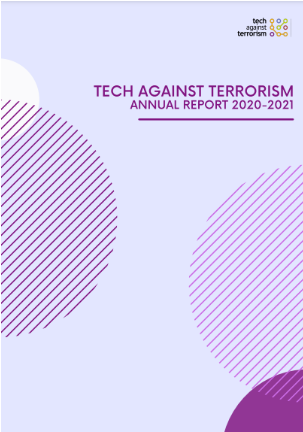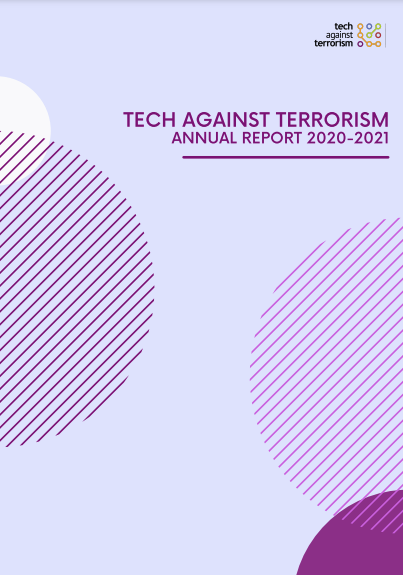August 2021 Update
- We are hiring! Tech Against Terrorism is looking for two paid interns to support the development of the Terrorist Content Analytics Platform (TCAP) over the next 6 months. More details can be found here.
Publications:
- We have published the Tech Against Terrorism Annual Report 2020-2021. We provide a detailed summary of our activities in 2020 and the first two quarters of 2021, across the three pillars of our support for the tech sector: outreach, knowledge sharing, and operational support.

Terrorist Content Analytics Platform (TCAP)
- The TCAP is now including official content from the Afghan Taliban. The inclusion of Taliban content has been escalated in response to recent events in Afghanistan but is in line with our group and content inclusion expansion plan.
Tech Against Terrorism recommends that tech companies remove or restrict access to content produced by the Taliban. Platforms should, in addition to looking to TCAP alerts and designation lists of democratic states, also assess groups, actors and the content they produce against based on their own rules on terrorism, violent extremism, and incitement to and/or glorification of violence. Whilst we appreciate that this is a challenging moderation issue, the fact that the Taliban now effectively constitutes the Afghan government should not prevent platforms from implementing their rules in this area and from removing material produced by a designated terrorist organisation.
Read our full statement here.
Our statement has been shared by media outlets across the world, including - Protocol
- Washington Post
- Wired Italy
- Le Monde
- The Hill
- L'Obs
- The Diplomat
Media Coverage
- Our Director, Adam Hadley, spoke with POLITICO Europe about the reactions we are seeing from online far-right extremist actors to the Taliban taking control of Afghanistan. Read the article here.
- We spoke with the New York Times on the topic of US-based extreme far-right's view on the Taliban’s victory. “We’ve come across a lot of content that’s U.S.-based extreme far-right websites saying how good the Taliban victory is, and why it’s good for their cause." You can read the article here.
- Our director, Adam Hadley, was quoted in a EURACTIV article on Twitter and Facebook’s approach to Taliban content given the fall of the Afghan government. He explains how Tech Against Terrorism encourages tech companies to restrict or remove Taliban content based on it being a designated terrorist organisation.
- Our OSINT team spoke with the Frankfurter Allgemeine Zeitung about the Taliban's use of online platforms. Article in German here.
- POLITICO Europe published an opinion piece by Adam Hadley, responding to law enforcement calls for backdoors to encrypted communications. He underlined that “A backdoor to encrypted communications would have a negligible effect on deterring terrorist activity”, and suggested the forensic use of metadata to detect terrorist use of E2EE services whilst maintaining privacy and security for users.
Webinars
- Thank you to everyone who tuned in for our latest TAT & GIFCT E-learning Webinar on, “United Nations’ Efforts in Counterterrorism and CVE: Resolutions, Mandates and Partnerships”. If you were unable to attend and would like to access a recording, please get in touch with us at contact@techagainstterrorism.org.

Tech Against Terrorism Reader's Digest – 10 September
Our weekly review of articles on terrorist and violent extremist use of the internet, counterterrorism, digital rights, and tech policy.
Top stories
- Brazil's President, Jair Bolsonaro, has signed a decree which limits tech platforms’ ability to moderate their services and remove content. This follows Youtube, Twitter, and Facebook’s decisions to remove posts from President Bolsonaro for violating their misinformation policies.
- Australia’s new Surveillance Legislation Amendment (Identify and Disrupt) Bill 2021 gives law enforcement the power to modify, delete, add, or copy data when investigating serious online crimes which present significant risks to free speech and press freedom.
- Big Brother Watch, the UK-based civil liberties campaign group, has published its latest “State of Free Speech Online” report.
- Google has temporarily suspended an unspecified number of Afghan government accounts.
- The trial of the 13 November 2015 terrorist attacks in Paris, in which IS-affiliated terrorists killed 130 people, has begun this week. This trial for France’s deadliest terrorist attack has been deemed the country’s “trial of the century”.
Islamist Terrorism
- Analysis: How are the Taliban organized?: This article, by Abdul Sayed, analyses the organisation of the Taliban by discussing its leadership and organisational structure, in parallel with the shadow government that the Taliban have just established. Sayed focuses on the structure of the Taliban leadership council after 9/11 and how this has developed into the division of bureaucratic positions in the Taliban’s current government. (Sayed, Voa News, 08.09.2021).
- This week, we are listening to the Taking Apart Terror podcast episode, "Afghanistan: has our world just got more dangerous?"
Our Senior Research Analyst, Anne Craanen, participated in episode four, “Do terrorists use apps”, give it a listen here.
Far-right Terrorism and Violent Extremism
- Opinion: It's a real possibility that our next 9/11 could arrive from within: This article, by Jason Blazakis, warns that the next terrorist attack of a similar scale to 9/11 could be organised by individuals and groups that adhere to far-right terrorist ideologies. Blazakis states that the "war on terror" launched after 9/11 has left the US unprepared for the current domestic threat. Blazakis outlines five ways of countering the threat from the violent far-right: to fund and expand FBI capabilities, update the domestic terrorism statute, treat the far-right challenge as a transnational issue, take the fight to social platforms, and enlist nongovernmental help. (Blazakis, The Washington Post, 06.09.21).
For any questions or media requests, please get in touch via:
contact@techagainstterrorism.org
